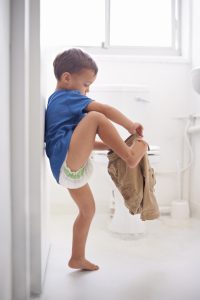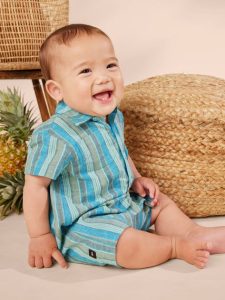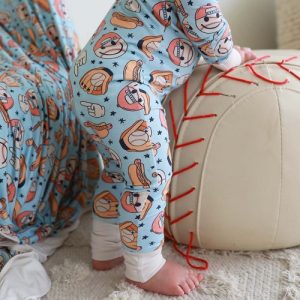Should baby boys wear diapers? Welcome to the wonderful world of parenthood! There are many decisions to be made, and diapering is one of the first. Disposable diapers are convenient and widely available, while cloth diapers can be more eco-friendly and cost-effective in the long run.
This article explores the pros and cons of disposable and cloth diapers to help you decide what’s best for you and your baby boy.
Disposable Diapers: Convenience and Absorption
Disposable diapers are incredibly absorbent and convenient. Here’s a closer look at the benefits:
Leakproof Protection:
Disposable diapers are designed to wick away moisture and prevent leaks.
Easy to Use:
Simply put on a clean diaper and dispose of the soiled one. No rinsing or washing required.
Widely Available:
Disposable diapers are readily available at stores and online retailers.
Travel Friendly:
Disposable diapers are convenient for travel and outings.
Drawbacks to Consider
While disposable diapers offer convenience, there are some drawbacks to consider:
- Cost: Disposable diapers can be expensive, especially over time.
- Environmental Impact: Disposable diapers contribute to landfill waste.
- Potential for Skin Irritation: Some babies may experience skin irritation from disposable diapers.

Cloth Diapers: Eco-Friendly and Reusable
Cloth diapers are a more traditional diapering option that offers environmental and economic benefits. Here’s why some parents choose cloth:
- Cost-Effective: Cloth diapers have a higher upfront cost, but they can be reused for multiple children, saving money in the long run.
- Environmentally Friendly: Cloth diapers are reusable and create less landfill waste.
- Soft and Breathable: Many parents find cloth diapers to be softer and more breathable for their babies.
Things to Consider with Cloth Diapers
Cloth diapering requires more effort than disposables. Here are some things to keep in mind:
- Washing Routine: Cloth diapers need to be washed and sanitized regularly.
- Leak Potential: Cloth diapers may not be as absorbent as disposables, so leaks can happen more frequently.
- Planning and Preparation: Cloth diapering requires planning and preparation, such as having a sufficient diaper supply and a designated laundry routine.
Hybrid Diapering: The Best of Both Worlds
Can’t decide between disposable and cloth diapers? Hybrid diapering might be the answer! Here’s how it works:
- Combine Disposable and Cloth: Use disposable diapers for outings and nighttime when convenience is key, and use cloth diapers at home when you have more time for laundering.
- Flexibility: Hybrid diapering allows you to find a balance between convenience and eco-friendliness.
Choosing the Right Diaper for Your Needs
The best diaper choice depends on your individual needs and preferences. Here are some questions to ask yourself:
- Lifestyle: How active are you and your baby?
- Budget: What is your budget for diapering?
- Environmental Concerns: How important is eco-friendliness to you?
- Laundry Routine: Do you have time for a regular cloth diaper washing routine?
The Most Important Factor: Your Baby’s Comfort
Ultimately, the most important factor is your baby’s comfort. Here are some tips:
- Experiment with Different Brands: Try different brands of disposable diapers to find one that fits your baby well and prevents leaks.
- Pay Attention to Your Baby’s Skin: If your baby experiences diaper rash, consider switching diaper types or using a barrier cream.
There is no right or wrong answer when it comes to diapering your baby boy. Disposable diapers offer convenience and ease, while cloth diapers are a more eco-friendly and economical option. Consider your lifestyle, budget, and environmental concerns to make the best decision for you and your little one. Most importantly, choose a diaper that keeps your baby comfortable and happy.
Beyond Disposable and Cloth: Other Diapering Options
There are additional diapering options available that parents of baby boys might consider:
Biodegradable Disposable Diapers: These diapers are designed to break down faster in landfills than traditional disposable diapers.
Diaper Liners: These disposable liners can be used inside cloth diapers to make them easier to clean and dispose of waste.
Elimination Communication (EC): This practice involves recognizing and responding to a baby’s cues to eliminate, aiming to potty train earlier. It’s important to note that EC should not be used to pressure toilet training and should be tailored to the baby’s development.
Research and Consult with Pediatricians
New diapering options and practices are emerging regularly. It’s always wise to research these options and consult with your pediatrician to find the best fit for your baby’s needs and your lifestyle.
Diapering Essentials (Regardless of Choice)
Here are some essential diapering supplies to have on hand, whichever type you choose:
- Diaper Rash Cream: Diaper rash is common. Having a gentle diaper rash cream on hand can help soothe and prevent irritation.
- Wipes: Baby wipes are convenient for cleaning your baby during diaper changes. Choose wipes that are fragrance-free and gentle on your baby’s skin.
- Changing Pad: A designated changing pad provides a comfortable and sanitary space for diaper changes.
Hygiene and Safety Tips
Always prioritize hygiene and safety during diaper changes:
- Wash your hands: Wash your hands thoroughly with soap and water before and after each diaper change.
- Clean from front to back: When cleaning your baby, always wipe from front to back to prevent the spread of bacteria.
- Dispose of diapers properly: Wrap soiled diapers securely and dispose of them in a designated diaper pail.
Diapering Decisions: A Personal Choice
Should baby boys wear diapers?There are many factors to consider when choosing diapers for your baby boy. Here’s a breakdown of some key points:
Disposable Diapers: Convenient and absorbent, but can be expensive and create waste.
Cloth Diapers: Eco-friendly and reusable, but require more laundry and planning.
Hybrid Diapering: Combines disposables and cloth for flexibility.
Other Options: Biodegradable disposables, diaper liners, and Elimination Communication (EC) are also available. Research is recommended.
Focusing on Your Baby’s Needs
No matter what type of diaper you choose, your baby’s comfort and health are top priorities. Here are some tips:
Observe Your Baby: Pay attention to your baby’s skin for signs of irritation.
Experiment with Brands: Find a diaper that fits well and prevents leaks.
Diaper Rash Cream: Use a gentle cream to soothe and prevent diaper rash.
Hygiene is Key: Always wash hands before and after diaper changes. Clean from front to back to prevent infection.
Conclusion
There is no one-size-fits-all answer to the question of whether baby boys should wear diapers. The best choice depends on your individual needs, preferences, and lifestyle. By considering the factors mentioned above and consulting with your pediatrician, you can make an informed decision that prioritizes your baby’s comfort and well-being.








